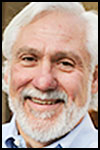Conkling: Every vote counts; don't waste yours
For young, first-time voters or disillusioned voters of any age, I have some advice based on first-hand experience: Don’t waste your vote. I cast my first presidential vote in 1968. Like a lot of college students at the time, I was opposed to the Vietnam War, disturbed by racial injustice and frustrated by the diversion of federal tax dollars away from the War on Poverty.
I was elated when President Lyndon Johnson decided not to seek re-election. I was sure progressive forces would carry the day. As things turned out, I was full of it.
Eugene McCarthy didn’t win the Democratic presidential nomination. Robert Kennedy and Martin Luther King Jr. were assassinated. George Wallace muddied the waters until his campaign collapsed. Richard Nixon, employing his Southern strategy of appealing to fear to win suburban voters, maneuvered himself into the Republican presidential nomination and a chance to win the White House. To say I was disillusioned would be wild understatement.
During summer break in 1968, while back home in Colorado, I attended a rally for eventual Democratic nominee Hubert Humphrey. From a distance, Humphrey seemed small, not especially well-spoken and a lowest-common-denominator choice for president.
I wanted to be impressed enough to vote for him, but I wasn’t. I was 21 years old and full of rage, like so many are today.
As a Colorado voter, I stared at the ballot and concluded I couldn’t vote for Nixon, Humphrey or Wallace. The name on the ballot that gave me some hope was comedian Dick Gregory, who ran as standard-bearer for the New Party.
Gregory was a well known satirist who headlined shows around the country, including the Playboy Club.
At the height of his popularity, Gregory became disillusioned with the ability to effect meaningful social change. He accepted an offer from Medgar Evers to appear at a voter registration rally in Jackson, Mississippi, in 1962.
Gregory was one of the first celebrities to be called after three activists were murdered in Mississippi. A year later, he was shot while facing down a police blockade during the Watts riots in Los Angeles.
Gregory developed an antipathy for Chicago Mayor Richard Daley. He protested outside Daley’s home and in 1967 ran as an independent to unseat Daley.
Gregory lost in a landslide. Instead of pouting, he immediately declared his candidacy for president.
Given little chance to be noticed, let alone win, Gregory plunged into his quixotic, anti-establishment campaign, using biting humor and sensational statements to gain attention.
He pointed out systemic corruption in politics and government. He called out racial injustice. He opposed a costly and pointless war.
He printed 1 million $1 bills with his face replacing George Washington’s, a stunt that drew the attention of the FBI and the threat of charges for counterfeiting. Gregory coyly defended himself, “Everyone knows a Black man will never be on a US bill.”
I admired Gregory then, and now, for not allowing his popularity to stand in the way of his principles. He viewed his campaign as a symbolic fist in the air against a power structure that ignored, exploited and killed Black people.
In the 1968 presidential election, I was one of 1,393 Colorado voters who cast a ballot for Gregory. He trailed the Socialist Labor candidate, who received 3,016, but managed to run ahead of the Prohibition candidate, who only got 275.
Nixon carried Colorado. Despite a relatively narrow plurality, he managed to capture 301 Electoral College votes and the presidency.
In the bigger scheme of things, my vote for Gregory didn’t matter, other than infuriating my father, a staunch John Birch Society Republican who later proclaimed, “Good Christians are good Republicans.”
When I told my dad my second choice was Humphrey, he seemed less disappointed in my vote for Gregory. In fact, he laughed and said, “You wasted your vote.”
I never felt foolish, ashamed or remorseful about my choice. Gregory’s views about corruption, injustice and the Vietnam War matched my own.
However, Gregory’s opposition to America’s two-party system was a view I came to see as righteous but wrong. Yes, there is enormous diversity of opinion and interests in America, but splintering into factions isn’t the way to accumulate electoral power and solve problems.
U.S. elections are like tugs-of-war.
There is one rope and two sides. You choose which end of the rope to pull. If you don’t pick a side, you become a spectator. You can scream, call fouls and impugn the participants, but spectators never get to hold the winner’s trophy.
I can sympathize with young voters who look at our political system today, shake their heads and search for an alternative. Been there, done that. The “system” is far from perfect, but it is our system and it can work.
Just six years after my first presidential vote, the Watergate scandal led to Nixon’s resignation and Americans sent a class of freshmen to Congress to force through significant reforms.
Two years later, Americans elected a peanut farmer from Georgia as president. He came to Washington as an untainted reformer. “The only way I know to be trusted is to be trustworthy,” he said.
In 1977, I left journalism to join the staff of Oregon’s Les AuCoin, one of those Watergate babies winning election to Congress.
By then, I had spent time watching and covering the political process, from the precinct level through Elks Club political gatherings to major election campaigns. I saw corruption and injustice, but I also witnessed Americans from all stations and stripes trying to make America better from the ground up. My college disillusionment had turned to cautious determination to join those trying to improve America — to help the nation finally achieve the lofty ideals expressed at its creation.
Before heading to Washington, D.C., I had recruited people to run for precinct committee positions in both parties, served as precinct committee person myself, and ran unsuccessfully as delegate to a national presidential nominating convention. I hung out with lots of local officials and lawmakers, and found most of them honest and sincere in trying to do the right thing.
Not all of them were bright. And a few were crooks.
In my earlier reporter role, I had written two major investigative stories – one about an alcoholic prosecuting attorney, the second about an off-the-rails state senator. My faith was reassured when voters defeated both at the ensuing election.
Suffice to say, I haven’t “wasted” my vote since the 1968 election.
Like others, I’ve had to inhale deeply before voting for a few candidates. I did so, and continue to do so, because I believe you vote for ideals as much as individuals.
Individuals can let you down. Ideals are more enduring. Sometimes, you vote because an individual’s record, despite their political affiliation, merits support and respect.
Now that I have become the embodiment of “Okay, Boomer,” I don’t expect younger, passionate and motivated voters to heed my advice. In their shoes, I might not take that advice either.
However, I do hope they can grow to see a bigger picture, the longer term project of democracy, the Great Experiment that is America.
Despite flaws, stumbles and a history of mendacity, America is worth the effort. And the greatest reforms are achieved when Americans vote, whether to throw out the old bastards or to reset with a new generation of leaders.
The ebb and flow of the nation has by and large paralleled our politics and our two-party system. When one party poops out or becomes irrelevant, a new one has sprung up to replace it.
The Republican Party arrived just in time to elect frontiersman Abraham Lincoln as president, and he led the nation through its great travail of civil war and emancipation. The modern Democratic Party was forged by an aristocratic polio victim who defied his economic class and embarked on the New Deal to combat the Great Depression.
Political candidates aren’t perfect. I know because I’ve been one of those, too.
But when they do their job by winning a majority of votes, then carry the ideas they campaigned on and believe in to their elective office, the will of the people — at least those who voted — is expressed.
That’s how democracy is supposed to work. That’s why who you vote for matters, even if it seems like a single vote doesn’t matter. In the end, every vote counts.
When it comes to president of the United States, there are really only two choices: You may not be enthusiastic about either candidate or the choice between them, but don’t let that tempt you to throw away your vote.
The temptation is alluring, as I proved in 1968.
Just remember, there are no moral victories when it comes to the presidency. Only one person occupies the White House, owns the bully pulpit and talks on the red phone.
Pick your end of the rope and starting tugging as hard as you can.













Comments
Sponge
Having read Dick Gregory’s autobiography in high school, I considered it an honor to meet him when he spoke at Linfield, years later.
I disagree that, “When it comes to the president of the United States, there are really only two choices” and, “there are no moral victories”. Honorable people should be able to vote for candidates of their conscience, without being saddled with the charge of “throwing away your vote.” We have been gamed into believing there are only two ends to the rope. Every vote counts; even the ones outside the dichotomous tug-of-war.